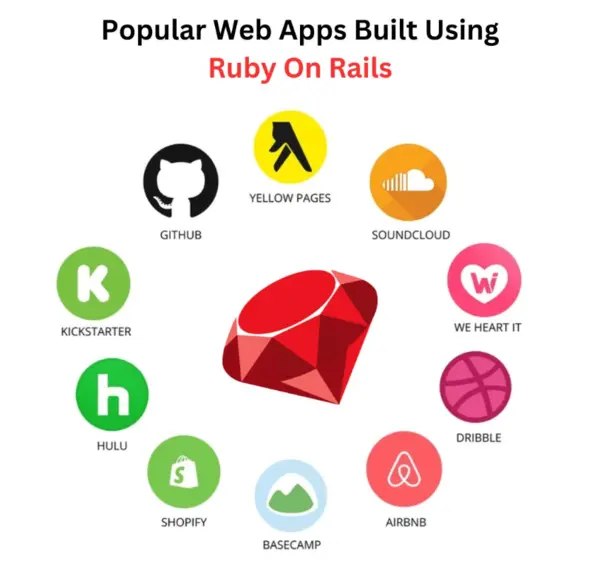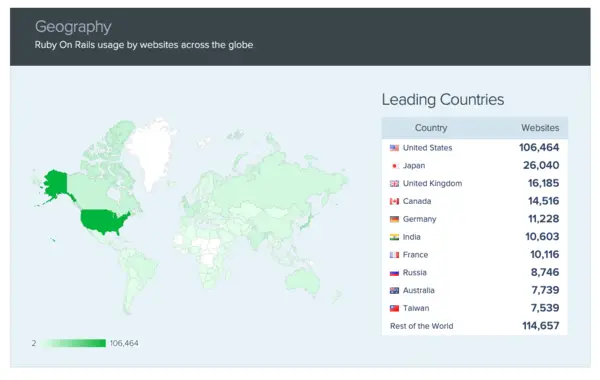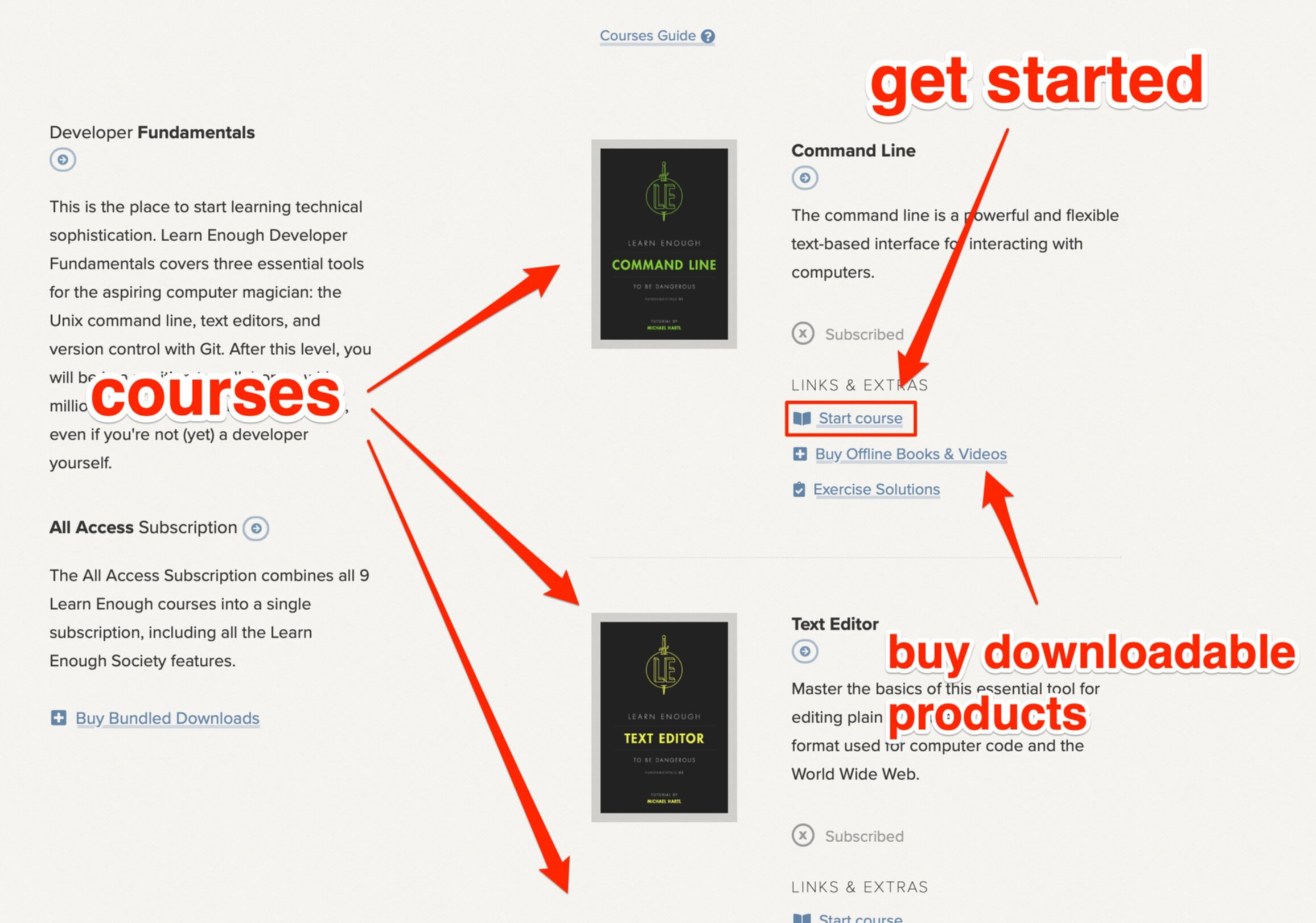
Why Ruby On Rails Is So Popular, After Almost 20 Years
Ruby on Rails (RoR) is a web application framework written in the Ruby programming language. Rails framework was first introduced in 2004 and has since become one of the most popular web development frameworks in the industry.
In this article, we'll explore what RoR is, its uses and popularity, why companies choose RoR, the job market for RoR, advantages from a business perspective, websites that use RoR, and why it is still a good choice in 2024.
What is Ruby on Rails?
Ruby on Rails is a Model-View-Controller (MVC) framework used for developing web applications. It's an open-source framework that's used to build websites and web applications.
Ruby on Rails provides a standardized and organized way to build web apps, making it easier for developers to write clean, maintainable, and scalable code.
RoR is built on the Ruby programming language, which is known for its simplicity and readability. It also has a large and supportive community of developers who contribute to the framework's ongoing development and provide resources for learning and troubleshooting.
What Ruby on Rails is used for and why it's so popular
Ruby developers use the Ruby programming language and RoR to develop web applications, such as e-commerce platforms, online stores, social networking sites, content management systems, and more.
It's popular for the following reasons:
1. Fast development
RoR has plenty of built-in features that make development faster and easier, including scaffolding, which generates the code for basic web application components.
RoR also has an extensive collection of libraries and plugins known as "Ruby Gems." These Gems add functionality to the framework, such as image processing, payment gateways, and email handling, among others.
With a very active Ruby community of experienced developers, you can find a Gem for everything.
Otherwise, hire skilled developers from one of the reputable Ruby on Rails development companies who have extensive knowledge of RoR for building web apps to web-based enterprise software solutions.
2. Agile methodology
RoR is designed for Agile software development methodologies. It allows Ruby developers to iterate quickly and efficiently, making it easier to change requirements and add new features on-the-fly.
3. Developer-friendly
With its simple syntax and strong community support, RoR is easy to learn—which makes it a great choice for new developers.
4. Object-oriented
RoR is an object-oriented programming framework, meaning it uses objects to represent data and functionality. This makes it easier to write reusable and maintainable code.

Ruby on Rails popularity ranking in 2024
Ruby and Ruby on Rails have been popular for many years and continue to be widely used in 2024. According to the TIOBE index, which ranks programming languages based on their popularity, Ruby—a robust general purpose programming language—was ranked 18th in March 2024.
This may seem underwhelming, but the RoR framework is still widely used by developers, and remains one of the top choices for both behavior and test-driven development. In fact, many of the world's biggest technology companies run on Ruby and its full stack framework, Ruby on Rails.
Examples of popular RoR use cases include:
Airbnb: Airbnb, the popular vacation rental platform, uses Ruby on Rails for its backend.
Basecamp: Basecamp, the well-known project management tool, was built using Ruby on Rails.
GitHub: GitHub, the world-renowned code hosting platform, uses Ruby on Rails for its front-end and back-end.
Hulu: Hulu, the popular streaming service, uses Ruby on Rails for its backend development.
Shopify: Shopify, the prolific e-commerce platform, uses Ruby on Rails for its backend.

GitHub contributors to Rails vs Django vs Laravel
With 4716 Ruby developer contributors on GitHub, RoR still dominates other popular frameworks like Django and Laravel, coming in at 2369 and 3100 contributors respectively.
|Framework|Contributors|
|---------|------------|
|Rails |4,716 |
|Django |2,369 |
|Laravel |3,100 |
There are 638,562 active websites and an additional 656,844 domains registered on the Ruby on Rails customer list today. 3,182,630 sites have used this technology in the past, and 11,483 websites in Japan are currently using Ruby on Rails.
Why do companies choose RoR for web development?
Companies choose Ruby on Rails for web development for several reasons:
1. Faster development
RoR allows developers to build web applications faster, which means that companies can launch products and features more quickly.
2. Cost-effective
RoR is open source and free to use, which can save companies a significant amount of money in licensing fees.
3. Developer-friendly
Ruby on Rails is developer-friendly, with a simple syntax and strong community support. This makes it easier for companies to find and hire skilled developers.
4. Scalable
RoR is highly scalable, which means that it can handle large amounts of traffic and data without compromising performance.

Job demand/job market for RoR
The demand for RoR developers has been relatively stable over the years. In fact, according to the job search website "Indeed," the demand for RoR developers has been steadily increasing since 2020.
According to data from Indeed, the average salary for a Ruby on Rails developer in the United States is $117,855 per year, making it one of the highest-paid programming languages. This is higher than the average salary for a web developer who uses other languages or frameworks, which is $75,430 per year.
In addition, job postings for Ruby on Rails developers have remained steady over the past few years, indicating that there is still a strong demand for this skill set.
According to the 2022 edition of Stack Overflow Annual Developer Survey, Ruby is ranked 5th among the top-paying technologies globally.
Advantages of Ruby on Rails from the business perspective
Ruby on Rails offers several benefits to businesses, including:
1. Faster development time
Rails' built-in conventions and simplicity allow developers to build applications more quickly than with other web frameworks. This translates into reduced costs and faster time-to-market.
2. Scalability
Rails is designed to scale up easily, making it a great choice for businesses that expect high traffic or need to expand their applications on-the-fly.
3. Cross-platform compatibility
Ruby on Rails can run on any operating system, making it a versatile choice for businesses with a variety of technology needs.
4. Community support
The Rails community is large and active, meaning that businesses can rely on a wealth of resources, such as tutorials, forums, and open-source libraries.
5. Flexibility
Rails can be used for a diverse range of applications, from simple websites to complex web platforms and applications. Its flexibility allows businesses to adapt their applications to changing needs over time.
6. Security
Ruby on Rails has built-in security features that help protect against common web application vulnerabilities such as SQL injection and cross-site scripting attacks.

Why Ruby on Rails is still a good choice in 2024
Ruby on Rails remains a popular choice for web development in 2024. Here are some reasons why:
1. Large and active community
The Ruby programming language and Rails development community is large and active, which means that developers have access to a wealth of resources, including tutorials, forums, and open-source libraries.
2. Mature technology
Ruby programming language has been around since 1995, while RoR has been around for over a decade. Meaning, it's had time to mature and develop a robust feature set.
3. Easy to learn
Ruby on Rails is known for its simplicity and ease of use, which makes it an ideal choice for new Ruby developers or developers who want to learn a new language quickly.
4. Scalability
Rails is designed to scale easily, which means that it can grow with a business's needs over time.
5. Cost-effective
Rails' simplicity and ease of use can help reduce development costs and time-to-market.
6. Versatility
Rails can be used for a variety of applications, from simple websites to complex web projects and powerful applications.
7. The Ruby community
The Ruby community is a dedicated and supportive group of developers who are always willing to help each other. This community is open and collaborative, with developers readily sharing their knowledge and experience with others.
The Ruby community also develops many open-source libraries and tools that make Ruby on Rails development more accessible, efficient, and reliable.
Examples of this include:
RubyGems: a package manager for Ruby that makes it easy to install and manage third-party libraries and dependencies.
RSpec: a testing framework for Ruby that allows developers to write and run automated tests for their applications.
Devise: a flexible and secure authentication solution for Rails applications.
8. Scalability and cost-effectiveness
Ruby on Rails is a scalable and cost-effective framework for any application-building web project.
Here are some reasons why:
Modular design: Rails applications are built using a modular design that allows a ruby developer to add or remove features as needed. This means that applications can be scaled up or down depending on their requirements, without having to rewrite the entire application.
Agile development: Rails applications are built using an Agile development methodology that emphasizes rapid prototyping, testing, and iteration. This approach allows developers to quickly identify and fix issues, and to add new features as needed.
Why Is Ruby great for startups?
Startups require agility, speed, and cost-effectiveness, and these are precisely what Ruby on Rails provides. Ruby on Rails is an excellent technology stack for startups, thanks to the following features:
1. Fast and Agile development
Ruby on Rails convention over configuration approach allows for faster and more efficient development.
It has a vast library of Gems that provide ready-made solutions to common problems, enabling developers to focus on core business features and save time during the development process.
2. Cost-effective
Ruby on Rails is open-source, which means there are no licensing costs. Startups can invest the money saved on licensing fees into other aspects of the business.
3. Scalable
Ruby on Rails is highly scalable, and startups can quickly add features as their business grows.
The framework's modular design makes it easy to modify and expand, making it an excellent choice for businesses that expect rapid growth.
4. Robust ecosystem
The Ruby on Rails ecosystem is vast, with an active community of developers creating new Gems, tools, and libraries.
This ecosystem ensures that startups using Ruby on Rails have access to a wide range of resources, which can help them grow quickly.
5. Easy to hire developers
Ruby on Rails is a popular framework, and many developers are familiar with it.
This means that startups can easily hire developers who have experience with Ruby on Rails, reducing the time and cost of onboarding new developers.
6. Developer productivity
Ruby on Rails has a short learning curve, which makes it easy for developers to start building applications quickly.
The framework's convention over configuration approach ensures that developers can focus on writing code lines and building features, rather than configuring the environment.

In conclusion
Ruby on Rails is a powerful and cost-effective framework that is ideal for startups and established brands alike.
It's fast development time, scalability, and robust ecosystem make it an excellent choice for all businesses that need to move quickly and efficiently.
Startups that choose Ruby on Rails can build powerful applications swiftly and cost-effectively, enabling them to focus on growing their business—and doing what they do best.
As an aspiring Ruby dev, it’s hard to know where to start. We highly recommend the “Learn Enough Ruby To Be Dangerous” tutorial. This comprehensive Ruby guide equips you with the nuts and bolts dev grit you need to dive into the more lucrative aspects of RoR app development.
Once you’ve built up those Ruby skills, our “Ruby On Rails Tutorial” is your logical next step—a leap, to be more exact. This insanely comprehensive intro to RoR will arm you with the confidence and skills required to enter the wider world of professional Rails development.
About Learn Enough
At Learn Enough, we provide carefully designed courses to take you from a beginner to a professional-grade developer.
Every Learn Enough All Access subscription includes the acclaimed Ruby on Rails Tutorial, our leading introduction to full-stack RoR development.
If you manage a team of developers, Learn Enough for Teams boosts the skills of your junior devs and gets your senior devs quickly up to speed with the latest versions of Ruby on Rails, and more.
Start your all-access 7-day free trial today!
All Access Subscription
Get free access to all 10 Learn Enough courses (including the Ruby on Rails Tutorial) for 7 days!
Free 7 Day trial details
We require a credit card for security purposes, but it will not be charged during the trial period. After 7 days, you will be enrolled automatically in the monthly All Access subscription.
BUT you can cancel any time and still get the rest of the 7 days for free!
All Learn Enough tutorials come with a 60-day 100% money-back guarantee.











